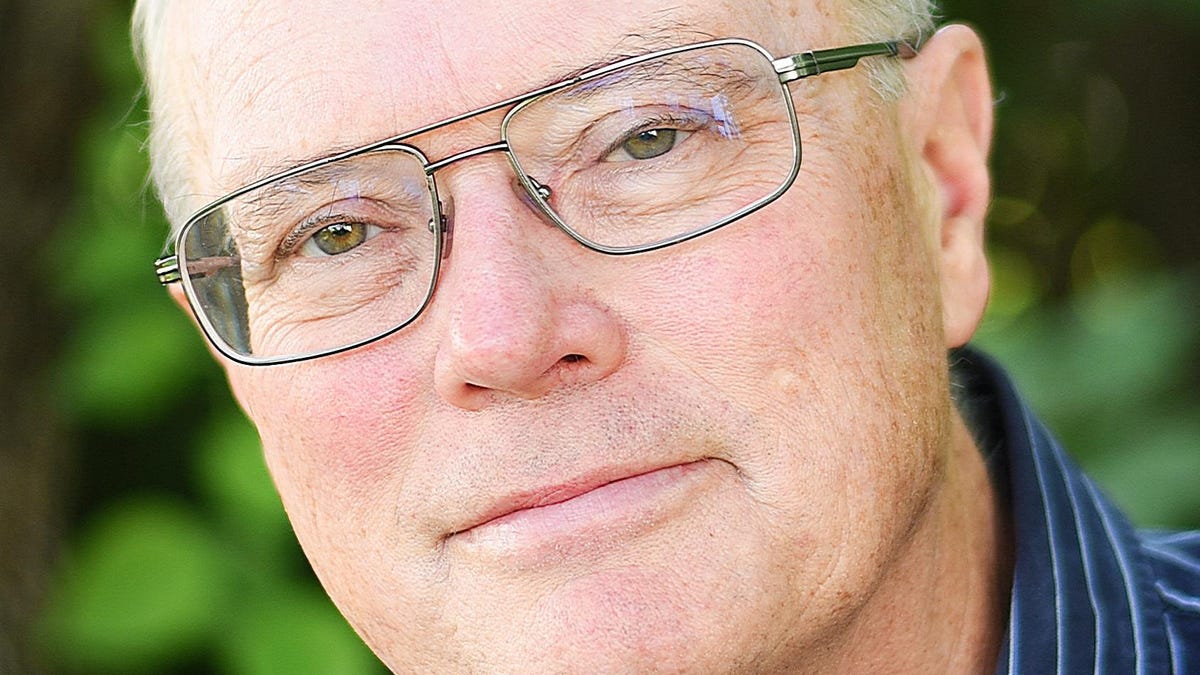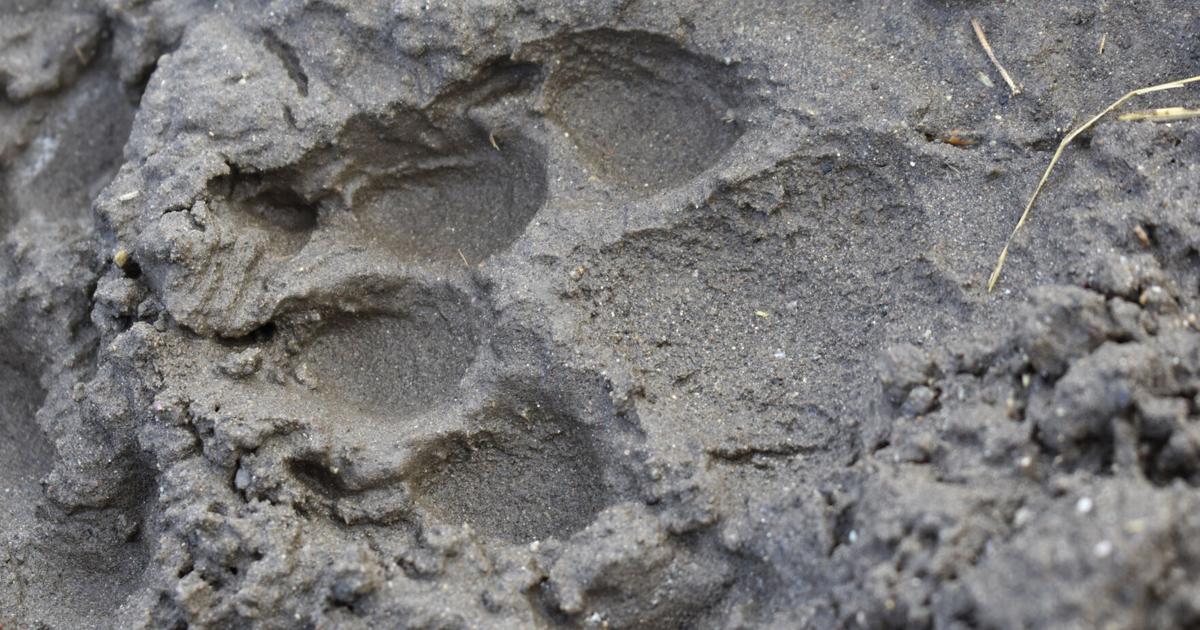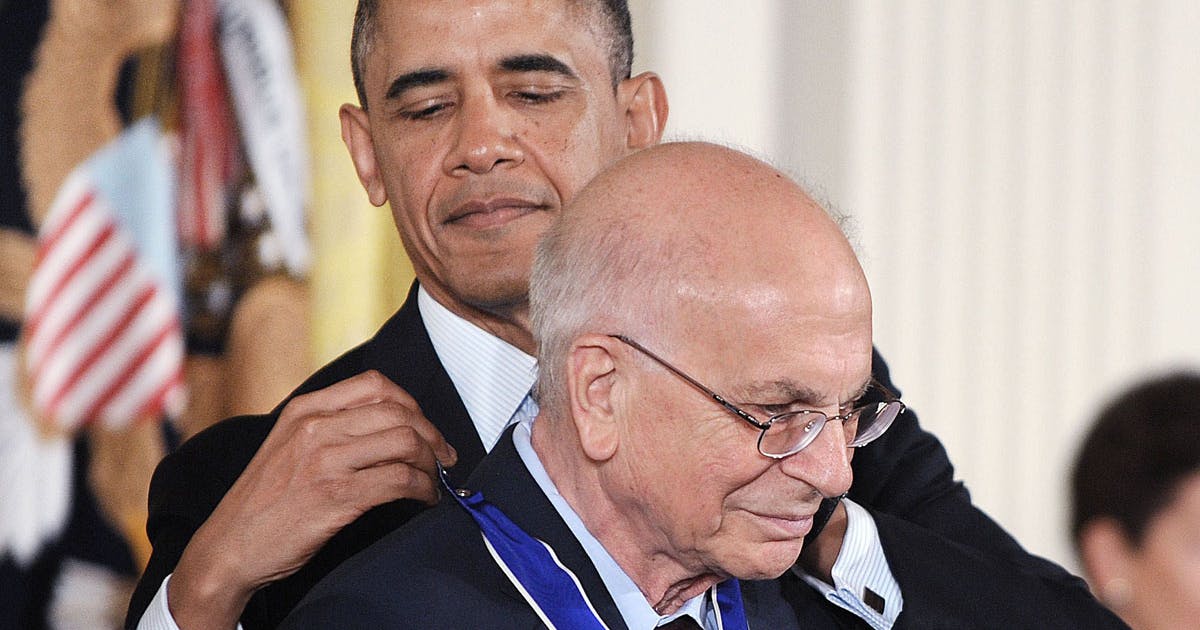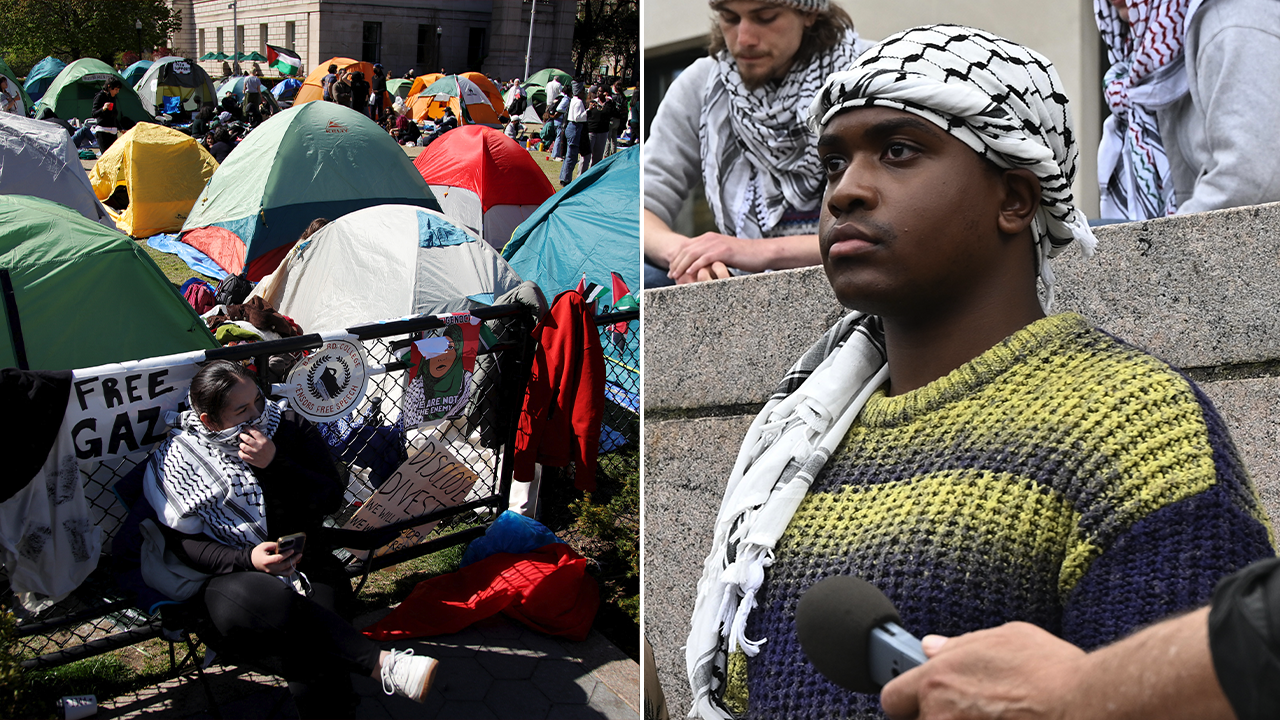World
India cautions nationals in Israel to move to safety
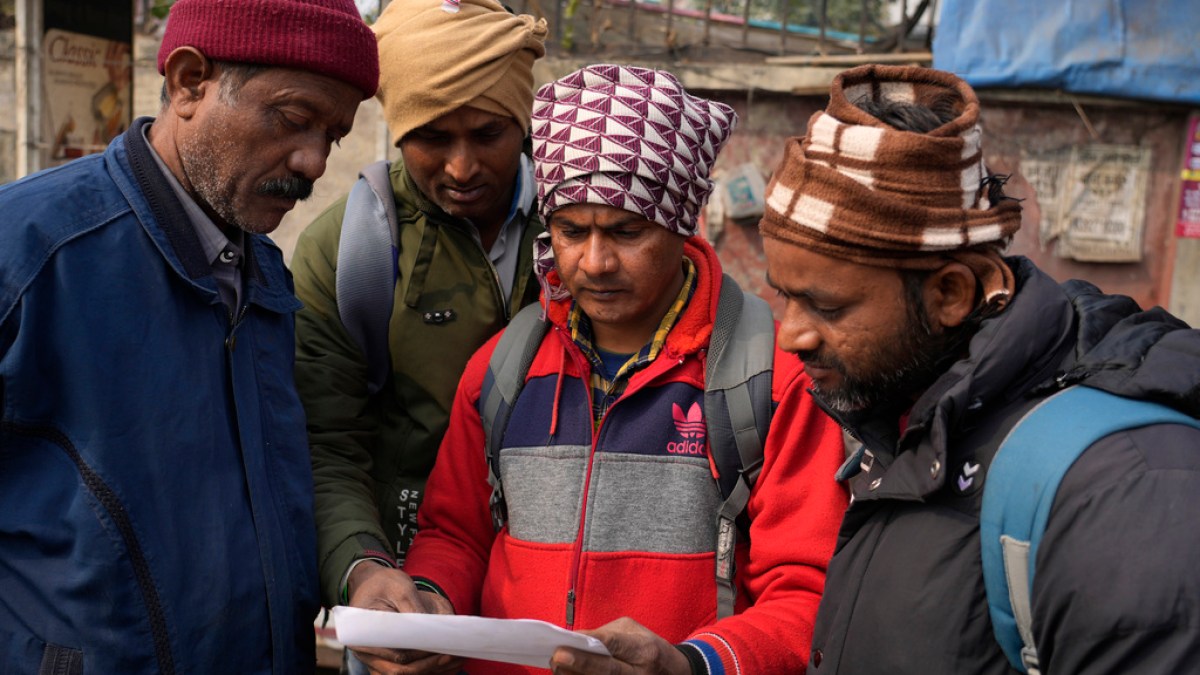
Embassy warning follows attack on border with Lebanon that killed an Indian worker.
India’s embassy in Israel has advised its nationals in Israeli border areas to move to safer parts after a missile attack near the border with Lebanon killed one Indian citizen.
The warning, issued on the embassy’s X account on Tuesday, advertised helplines offering further advice to citizens. Thousands of Indian workers have been hired to replace Palestinians blocked from entering Israel since the outbreak of the war in Gaza.
The advisory specified that the embassy was in touch with the Israeli authorities “to ensure the safety of all our nationals” following the death on Monday.
📢*IMPORTANT ADVISORY FOR INDIAN NATIONALS IN ISRAEL* pic.twitter.com/Fshw7zcbmj
— India in Israel (@indemtel) March 5, 2024
The Indian’s death was confirmed in a statement issued on X by Israel’s embassy in New Delhi.
The attack, which the embassy claimed was carried out by Hezbollah, struck workers cultivating an orchard in the Israeli village of Margaliot. Two other Indians were reportedly injured, along with at least five other foreign workers.
The Indian Express newspaper identified the dead victim as Nibin Maxwell, 31, from the town of Kaikulangara in the southern Indian state of Kerala. He had reportedly moved to Israel two months ago to work on a farm in Margaliot.
We are deeply shocked and saddened by the death of one Indian national and the injury of two others due to a cowardly terror attack launched by Shia Terror organization Hezbollah, on peaceful agriculture workers who were cultivating an orchard at the northern village of Margaliot…
— Israel in India (@IsraelinIndia) March 5, 2024
Israeli construction companies have reportedly requested that the government in Tel Aviv allow them to hire up to 100,000 Indian workers to replace Palestinians whose work licences were suspended after the Gaza offensive began in October.
Al Jazeera reported in January that Indians have been queueing up to apply for tens of thousands of jobs advertised.
The apparent success of the recruitment drive has given the lie to Prime Minister Narendra Modi’s claims that India is becoming a global economic powerhouse on the back of booming gross domestic product (GDP).
Modi established warm relations with Israeli Prime Minister Benjamin Netanyahu as he began his premiership in 2014 in the now world’s most populous country.
The Hindu nationalist government has stood staunchly behind Israel amid its war on Gaza, overturning decades of support for the Palestinian cause.
The conflict has become a lightning rod for sectarianism in India, with right-wing social media accounts driving local anti-Muslim sentiment and spreading fake news far beyond its borders.

World
Vietnam parliament chief quits amid deepening political turbulence

World
Italian PM Meloni ally fires back against criticism says policies the same but 'Europe has changed'

FIRST ON FOX – A close ally to Italian Prime Minister Giorgia Meloni told Fox News Digital that criticism against her for abandoning policies on illegal migration and other issues is unfounded.
Italian Vice Minister of Foreign Affairs Edmondo Cirielli told Fox News Digital, “Giorgia Meloni hasn’t changed, Europe has changed.” Cirielli is the co-founder and national coordinator of Meloni’s party, the Fratelli D’Italia Party.
He said Italy is inspiring the European Union president to follow its strong conservative stances.
MELONI’S SHIFT FROM ANTI-GLOBALIST TO PRO-EUROPE, BIDEN BUDDY INFURIATES BASE: ‘WILL NOT VOTE FOR HER ANYMORE’
The leader of Fratelli d’Italia, Giorgia Meloni, in Rome on Sept. 22, 2022 for the closing of the election campaign for the general election in Italy on Sept. 25, 2022. (Getty Images)
He said that the Europe of Ursula von der Leyen is paying attention to Italy’s policies and “is listening to Italy’s reasons. Italy has always wanted nations to be stronger in Europe and is leading the rest of the European Union on this. Von der Leyen herself is accompanying Meloni in her action against illegal immigration. They have already intervened in Egypt and Tunisia. We will soon do it in Libya too.”
He added “among other things, there are European elections in a few months and the conservative party led by Giorgia Meloni, the European Conservative Party led by Giorgia Meloni, will give a new direction to this Europe. And the European Parliament itself, the European People’s Party itself, will have to take into account the problems that exist today and that Giorgia Meloni identified during her electoral campaign.”
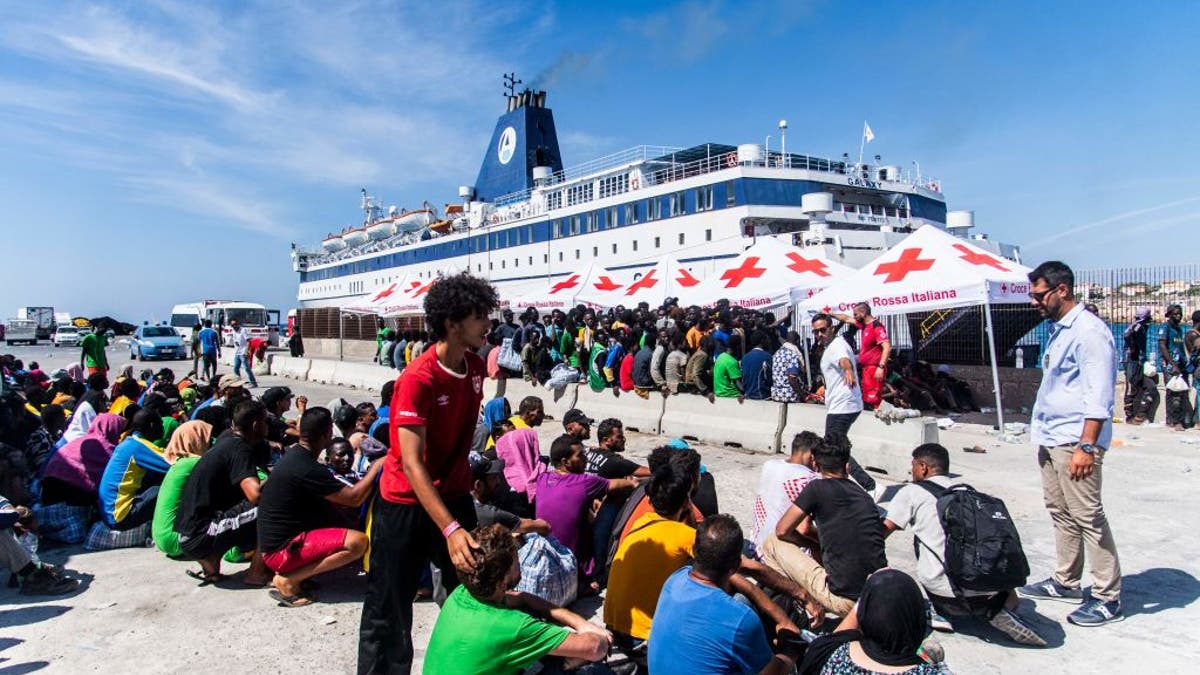
Migrants from a migrant housing center on the Italian island of Lampedusa are guided by a security official on Sept. 14, 2023 as they prepare to board the ship “Galaxy”, bound for the Sicilian town of Porto Empedocle. The island struggled to cope with a surge in migrant boats from North Africa after numbers peaked at 7,000 people, equivalent to the entire local population. (Photo by ALESSANDRO SERRANO/AFP via Getty Images)
Birth rates in Italy have dropped to a record low in 2023 with a 15th consecutive annual decline. In 2023, Italy recorded 379,000 births, a 3.6% decline from 2022.
Cirielli said the problem does not only concern Italy, but concerns all of Western Europe. In its 2024 budget, Italy earmarked around 1 billion Euros (approximately $1.1 billion) for several measures aimed at addressing Italy’s demographic crisis.
“We are implementing a series of policies aimed at supporting births, birth rates and young couples, both on an economic and financial level, and this is obviously also a social phenomenon. It’s about changing your mindset and understanding that life is an opportunity and a joy for everyone,” the deputy foreign minister said.
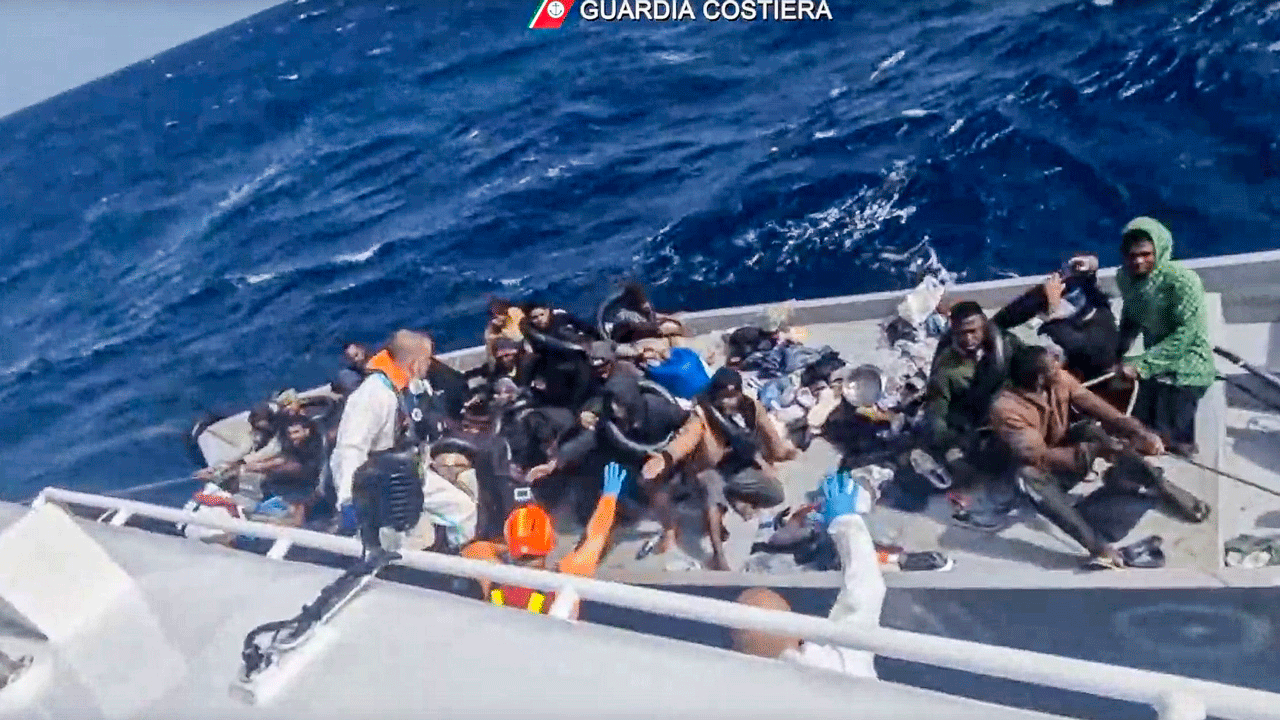
In this image taken from a video released by the Italian Coast Guard on Thursday, April 11, 2024, a boat with migrants is approached by a rescue operation off the island of Lampedusa in the Mediterranean Sea. The Italian Coast Guard rescued 22 people and recovered nine bodies on Thursday, April 10, 2024, after a smugglers’ boat capsized in storm about 30 miles south of the island of Lampedusa. (Photo: Italian Coast Guard.)
The journey from North Africa to Italy has become one of the busiest migration routes with data showing migrant arrivals jumping 50% in 2023 from the previous year.
Cirielli accompanied Prime Minister Meloni last week on her fourth visit to Tunisia in a year when they signed new accords as part of Italy’s “Mattei Plan” for Africa.
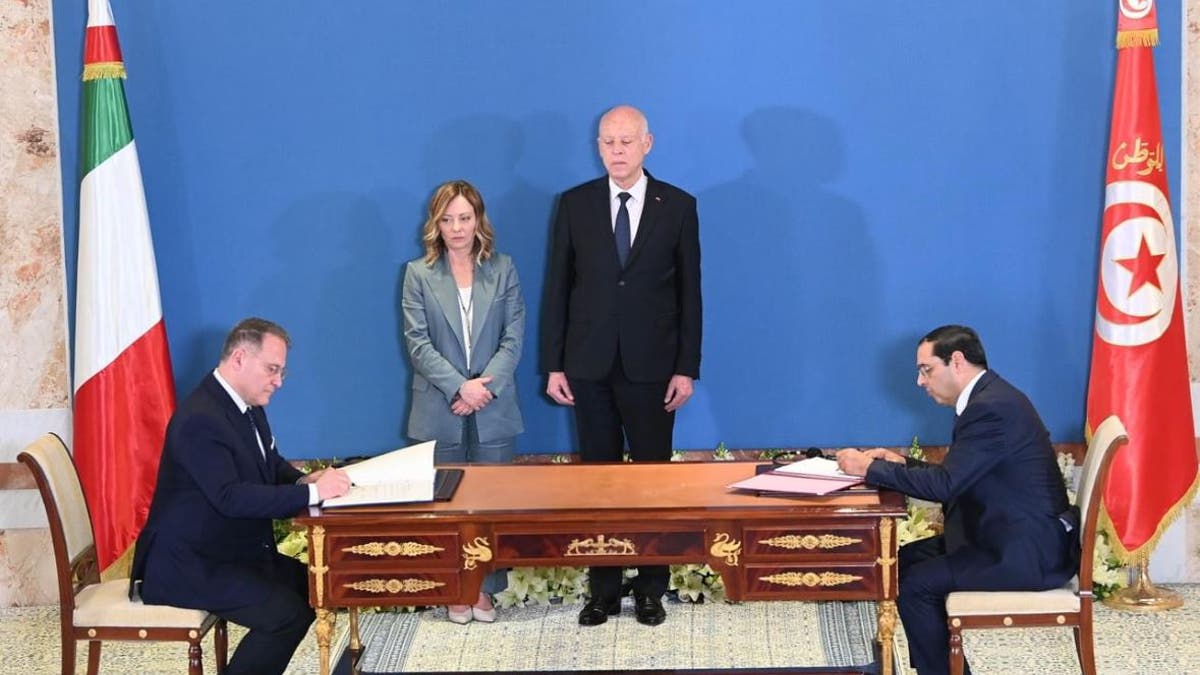
Italian Deputy Minister for Foreign Affairs and International Cooperation, Edmondo Cirielli, left, signs accords along with Italian Premier Giorgia Meloni and Tunisian President Kais Saied, center right. (Photo: Gerardo Antelmo/ Office of the Vice Minister Edmondo Cirielli.) (Gerardo Antelmo/ Office of the Vice Minister Edmondo Cirielli)
“We are faced with an epochal fact that does not only concern Italy,” said Cirielli.
MORE THAN 63,000 MIGRANTS HAVE DIED OR GONE MISSING SINCE 2014, UN AGENCY REPORTS
The Mattei Plan seeks to tackle education and training, agriculture, health, water and energy development while aiming to make Italy an energy hub to transport natural gas supplies from Africa to the rest of Europe.
“We are intervening, first of all, with agreements with North African countries to prevent the departures from these coasts, but above all, we are trying to come to the places of origin of the migration. They are trying to help development and at the same time also provide legal channels of migration. Because the real problem is not migration itself and rather it is the criminal organizations that are behind the trafficking of migrants which is creating a new slave trade.”
He added, “This globalization is becoming very powerful on a financial level, exploiting this trafficking and in this way destabilizing Africa, becoming criminal organizations that launder this money from international trafficking, funneling it into drugs, armaments and also to often support the causes of terrorist organizations.”
Under Italy’s rotating stewardship, the G-7 foreign ministers met last week on the Italian resort island of Capri with calls for new sanctions against Iran over its attack against Israel.
“Italy, with the presidency of the G-7, has condemned Iran’s action and knows well that Iran is carrying out a destabilizing action in the Arabian Peninsula in the Middle East, but it is equally true that we do not need an escalation… Israel’s bombing of a consular office, the diplomatic headquarters, was also a risky act. On the other hand, all of the G-7 noted that Iran’s response was a response, this time a balanced, moderate response compared to the episode itself.”
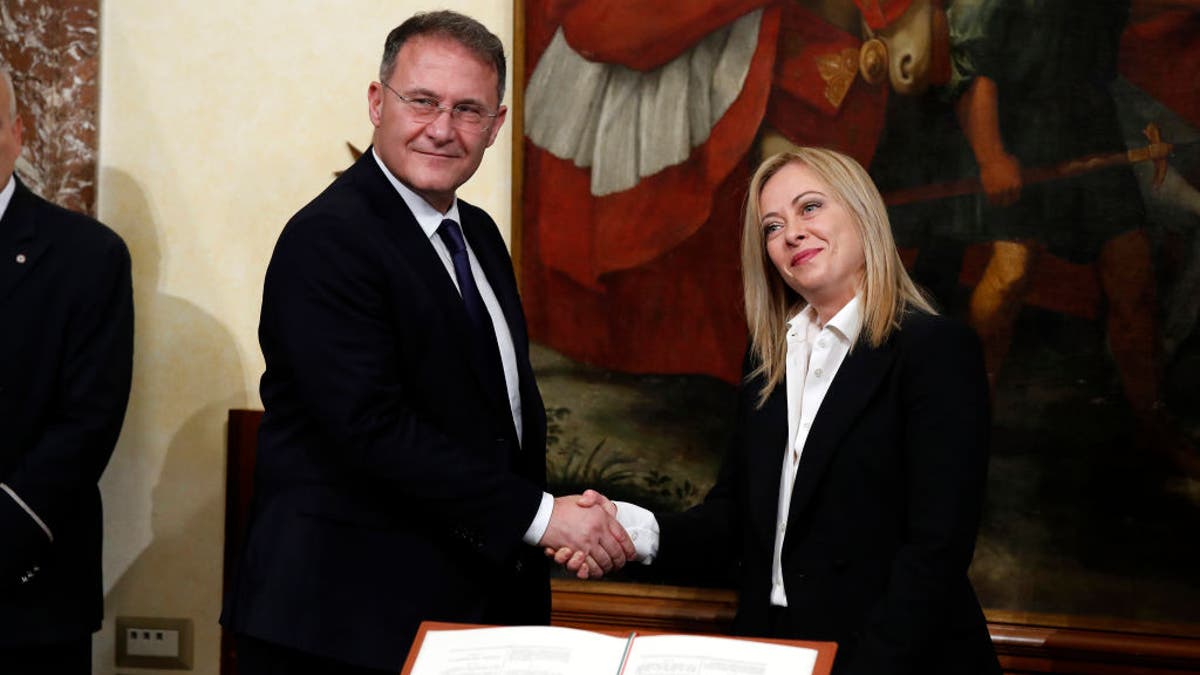
Italian Prime Minister Giorgia Meloni and Italian Undersecretary of the Ministry of Foreign Affairs and International Cooperation Edmondo Cirielli during the ceremony of Oath of the Undersecretaries at Palazzo Chigi. Rome (Italy), November 02nd, 2022 (Photo by Massimo Di Vita/Archivio Massimo Di Vita/Mondadori Portfolio via Getty Images)
Cirielli added “It was understood that the Iranian government does not want an escalation and therefore everyone agrees, in the G-7, at the invitation following the lead of Biden and Giorgia Meloni and neighbors who are close and ready to support,Israel, especially Israel’s right to defend itself and Israel’s right to exist. But we must carry forward a de-escalation and prevent a regional war from erupting from this issue in Gaza.”
In December, Italy withdrew from China’s Belt and Road Initiative which intended to rebuild the Silk Road to connect China with Asia and Europe by expanding China’s infrastructure spending on roads and shipping routes.
Cirielli says the move to withdraw is not an interruption between the relationship of Italy and China but in the best interest of Italian trade.
CLICK TO GET THE FOX NEWS APP
“It was a mistake by the Conte Government and the center-left governments that preceded us to make a political agreement because this seemed inconsistent with the alliance of the North Atlantic Treaty and also with the European Union…we terminated this agreement at the natural deadline and are establishing a new economic-social partnership, as like France and Germany have known. Therefore, there is not an interruption of relations, but a different modulation based on ancient, thousand-year-old relations almost only between the Italic peoples and the Chinese peoples, based absolutely on good dialogue, on profitable trade for both.”
The “Opposition had said that it is not wrong to have diplomatic relations or economic relations with China, it is wrong to have a political relationship that is underlying the agreement launched by China towards the world,” he concluded.
World
The Abu Ghraib abuse scandal 20 years on: What redress for victims?
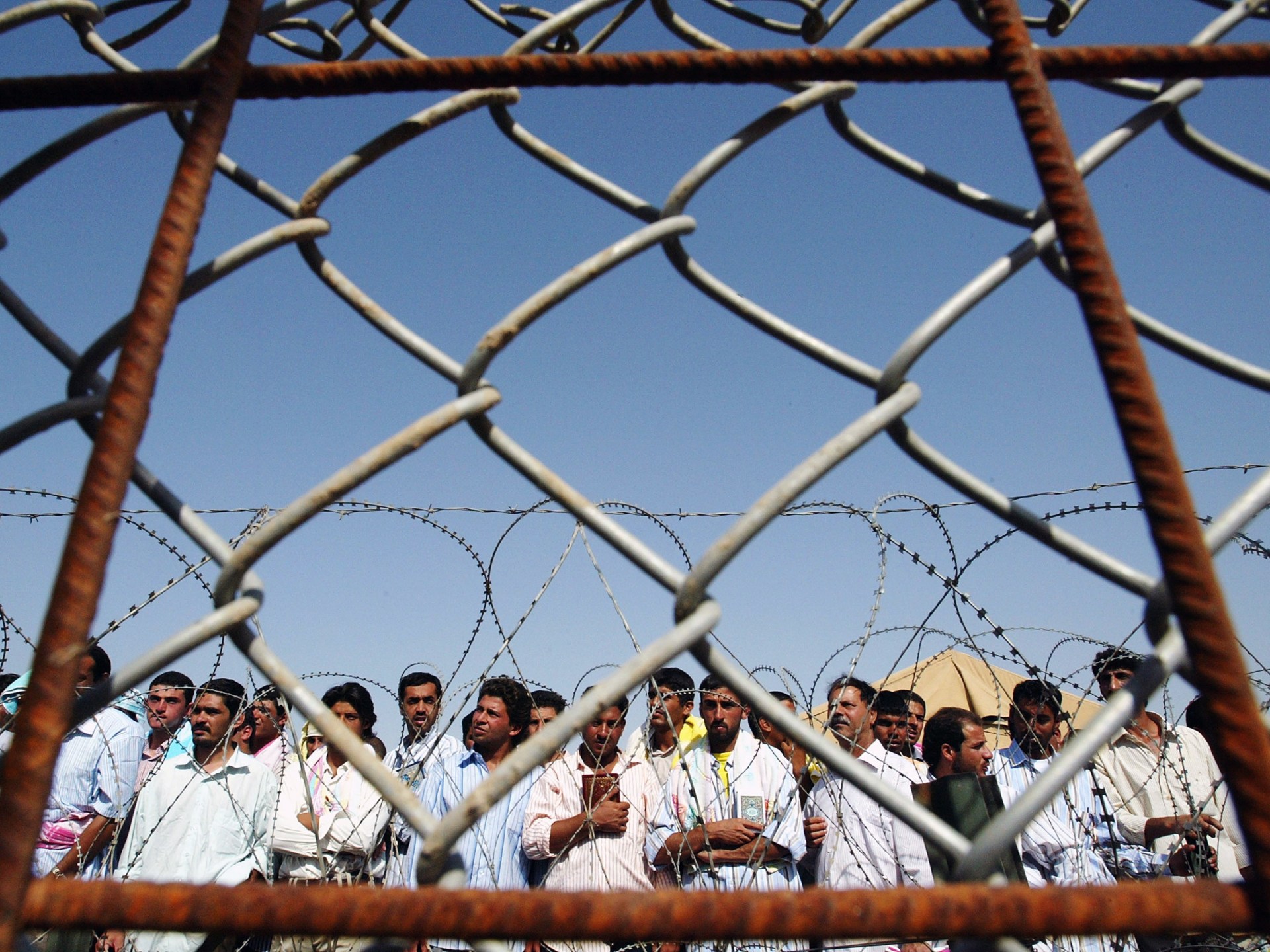
When the US TV news programme 60 Minutes II revealed images of Iraqi men being abused and humiliated by their American jailers at Abu Ghraib prison in Iraq 20 years ago this weekend, the United States-led invasion and subsequent occupation of Iraq was just 13 months old.
Toppled Iraqi President Saddam Hussein, who had been captured by US forces more than four months earlier, was awaiting trial on charges of crimes against humanity, and the Iraqi state itself was in the grip of violence and disorder.
For many in the Arab world, Abu Ghraib quickly became a symbol of US imperialism and hypocrisy, shattering then-US President George W Bush’s repeated claims that the US was a bastion of human rights.
Two decades later, a civil case that has been brought by Abu Ghraib victims against a US contractor that operated at the prison is under way. Many are now viewing Israel’s ongoing US-backed military action in the Gaza Strip, where more than 34,000 Palestinians have been killed since October, through the prism of the Abu Ghraib scandal, which first came to light on April 28, 2004, and sent shockwaves around the world.
What did the Abu Ghraib images show?
The photographs broadcast on 60 Minutes showed US guards at Abu Ghraib subjecting Iraqi prisoners to various forms of violence, sexual assault and humiliation. Many of the prisoners had been apprehended by US soldiers on suspicion of being part of armed groups, but according to the International Red Cross, 70 percent to 90 percent of them were innocent bystanders who had been arrested mistakenly.
One image showed naked prisoners heaped into a pyramid with their US captors standing smiling behind them. Another showed a US soldier holding a naked prisoner on a leash.
However, the defining image of the scandal proved to be the haunting depiction of a hooded Iraqi man holding electrical wires and standing on a box.
Then-US General Mark Kimmitt, who was deputy director of coalition operations in Iraq and was interviewed for the April 2004 CBS News story, said: “Frankly, I think all of us are disappointed at the actions of the few. You know, every day we love our soldiers, … but frankly, some days we’re not always proud of our soldiers.”
Subsequent revelations by CBS News disclosed that the US army report on which the US broadcaster had based its original story on Abu Ghraib had in fact detailed “numerous incidents of sadistic, blatant, and wanton criminal abuses” of Iraqis by US soldiers at the prison.
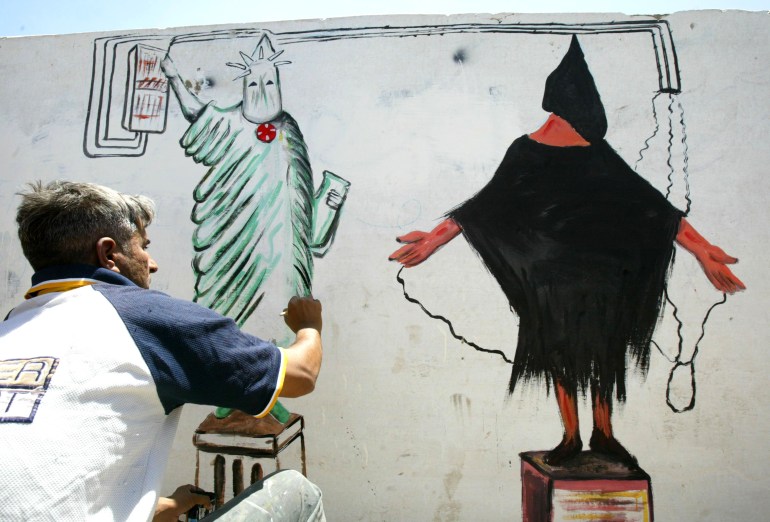
Was there any other evidence of abuse at Abu Ghraib?
Soon after the photographs of US soldiers humiliating and mistreating Iraq men were released on CBS News, the International Committee of the Red Cross published its own report on abuse at the prison.
The report detailed incidents of abuse witnessed by Red Cross observers from March to November 2003 and carried out “during arrest, internment and interrogation”, particularly of “persons arrested in connection with suspected security offences or deemed to have an ‘intelligence’ value”.
The Red Cross said it had uncovered numerous examples of violations of the Geneva Conventions by US military personnel. For example, the report said Red Cross observers had witnessed US soldiers mistreating Abu Ghraib prisoners by keeping them naked in total darkness in empty cells.
In the executive summary for its report, the Red Cross said so-called high value detainees “were at high risk of being subjected to a variety of harsh treatments ranging from insults, threats and humiliations to both physical and psychological coercion, which in some cases was tantamount to torture, in order to force cooperation with their interrogators”.
The abuse was, “in some cases, tantamount to torture”, the Red Cross report said.
Were any US soldiers held accountable?
Private Lynndie England, the soldier pictured holding a leash attached to a naked Iraqi man lying on the ground at Abu Ghraib prison, which had been a notorious place of torture during the presidency of Saddam Hussein himself, appeared in several prisoner abuse images. In 2005, England was found guilty of six counts of abuse by a US military court and sentenced to three years in prison. She was released in March 2007.
Charles Graner Jr, a US army prison guard convicted by a military court of leading the abuse of detainees at Abu Ghraib, was handed a 10-year prison term in 2005 after being convicted of five counts of assault, maltreatment and conspiracy. Graner was freed in August 2011.
Of the 11 soldiers court-martialled by the US military for mistreating Iraqi prisoners at Abu Ghraib, nine were given jail time.
But it soon became apparent that American abuse of Iraqi inmates was not confined to Abu Ghraib. Indeed, after CBS revealed the Abu Ghraib scandal, the news corporation started to learn of the existence of army investigator interviews that also brought to light the abuse of prisoners at other detention centres in Iraq, such as al-Mahmudiya prison, a temporary holding facility, for which other US military personnel were also jailed.
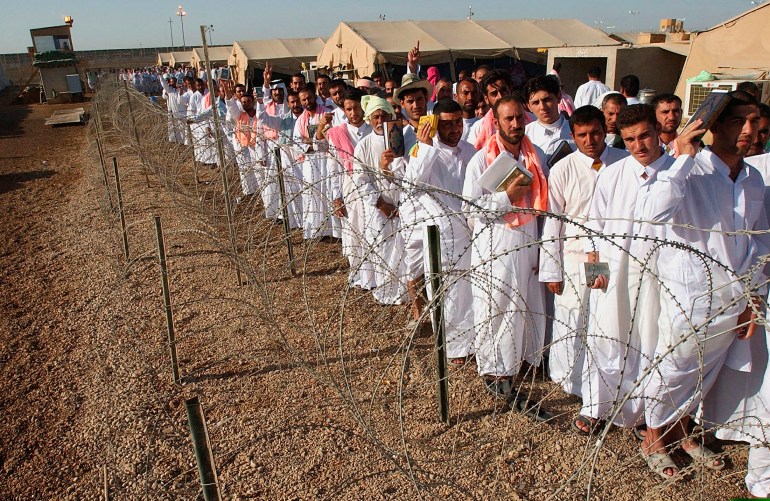
Have Iraqi victims of US torture received any kind of redress?
In September, Human Rights Watch said: “The US government has apparently failed to provide compensation or other redress to Iraqis who suffered torture and other abuse by US forces at Abu Ghraib and other US-run prisons in Iraq two decades ago.”
The existence of the Federal Tort Claims Act, which gives the US government immunity from any lawsuits arising during war, means seeking redress is particularly difficult.
Instead, Iraqi victims of US abuse have been forced to pursue US military contractors, which Chris Bartlett, a US photographer who has been shooting portraits of Abu Ghraib’s torture survivors since 2006, noted to Al Jazeera were “hired … to create a layer of liability distance so the federal government could be shielded from responsibility”.
Most recently, on April 15 this year, a federal court in Virginia began hearing the case of Al Shimari et al v CACI, a private security firm hired in 2003 by the US government to interrogate Iraqi prisoners at Abu Ghraib.
The defendants are being represented by the US-based Center for Constitutional Rights, which in 2013 won a $5m settlement for its Iraqi clients from Titan Corp, another military firm working at Abu Ghraib.
In the Virginia case, the advocacy group is seeking compensation for three Iraqi clients – Suhail Najim Abdullah Al Shimari, Salah Al-Ejaili and As’ad Al-Zuba’e – who allege that “CACI participated in a conspiracy to commit unlawful conduct including torture and war crimes at Abu Ghraib prison,” where they were tortured.
On Monday, the eight-person jury in the case retired to consider its verdict.
Why has Israel’s war on Gaza drawn comparisons with US torture at Abu Ghraib?
Israel’s deadly campaign of air strikes against the Hamas-governed Gaza Strip, which began on October 7, was soon followed by reports of Israeli soldiers beating and humiliating detained Palestinians, which many likened to US torture at Abu Ghraib.
On October 31, the pro-Palestinian advocacy group Jewish Voice for Peace wrote on X: “The footage of Israeli soldiers torturing Palestinian men in the West Bank is horrific. The Israeli military has brutally abused Palestinian prisoners for decades. As the Israeli military wages a genocidal war in Gaza, its soldiers are no longer hiding this abuse from the public.”
It added: “It’s no surprise … that the same government that tortured Iraqis in Abu Ghraib is funding the same tactics on Palestinians.”
Sarah Sanbar, an Iraq researcher at Human Rights Watch, told Al Jazeera that a former Iraqi detainee told her images of stripped Palestinians being rounded up and restrained by Israeli forces in Gaza were “very retraumatising and triggering and took him right back to 2003 and 2004 when he was being tortured [by the Americans] at Abu Ghraib”.
-

 Movie Reviews1 week ago
Movie Reviews1 week agoMovie Review: The American Society of Magical Negroes
-

 World1 week ago
World1 week agoIf not Ursula, then who? Seven in the wings for Commission top job
-

 Kentucky1 week ago
Kentucky1 week agoKentucky first lady visits Fort Knox schools in honor of Month of the Military Child
-

 World1 week ago
World1 week ago'You are a criminal!' Heckler blasts von der Leyen's stance on Israel
-

 Politics1 week ago
Politics1 week agoTrump trial: Jury selection to resume in New York City for 3rd day in former president's trial
-

 News1 week ago
News1 week agoHouse passes bill requiring warrant to purchase data from third parties
-
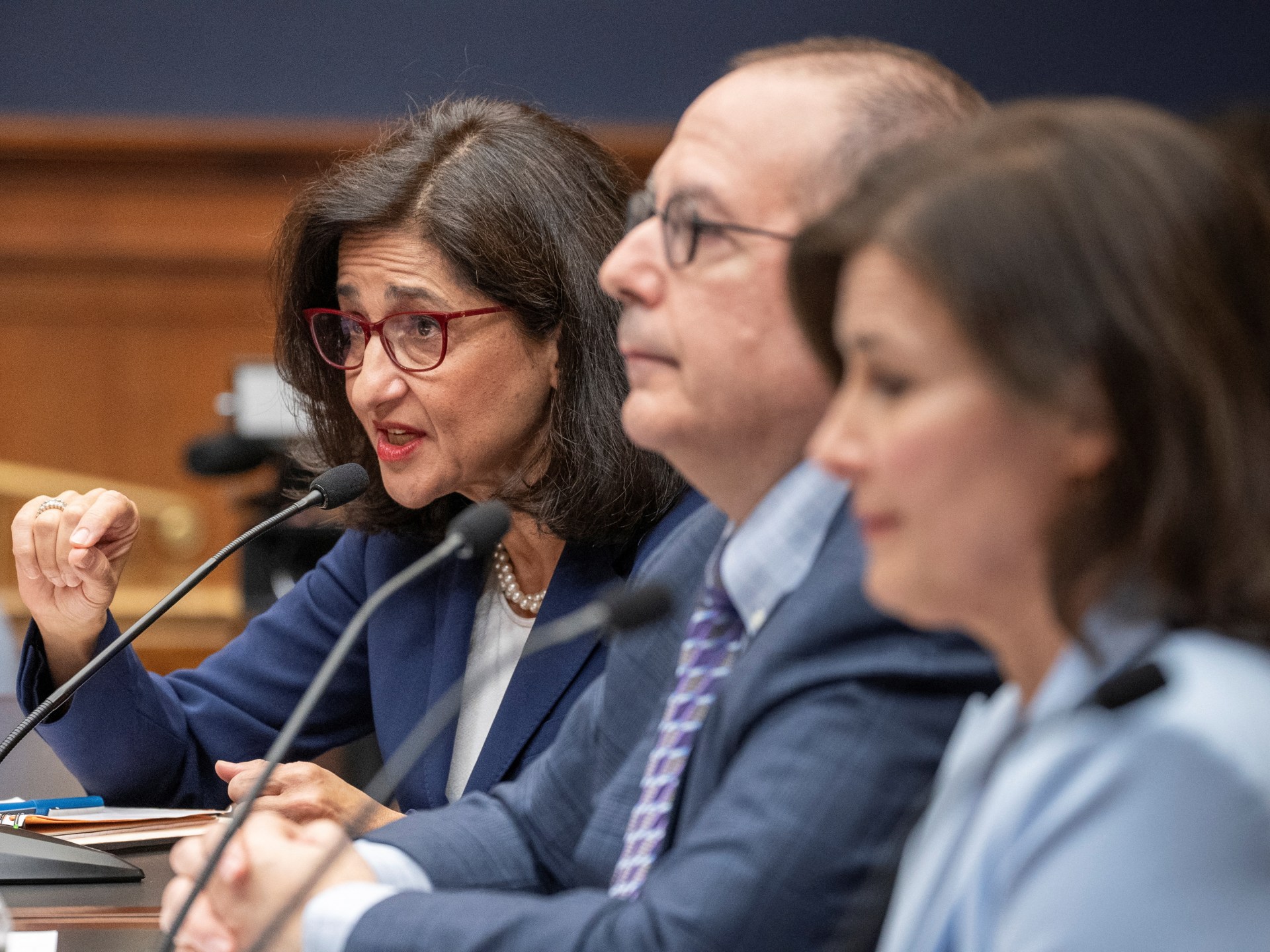
 World1 week ago
World1 week agoColumbia University leaders face scrutiny over anti-Semitism on campus
-
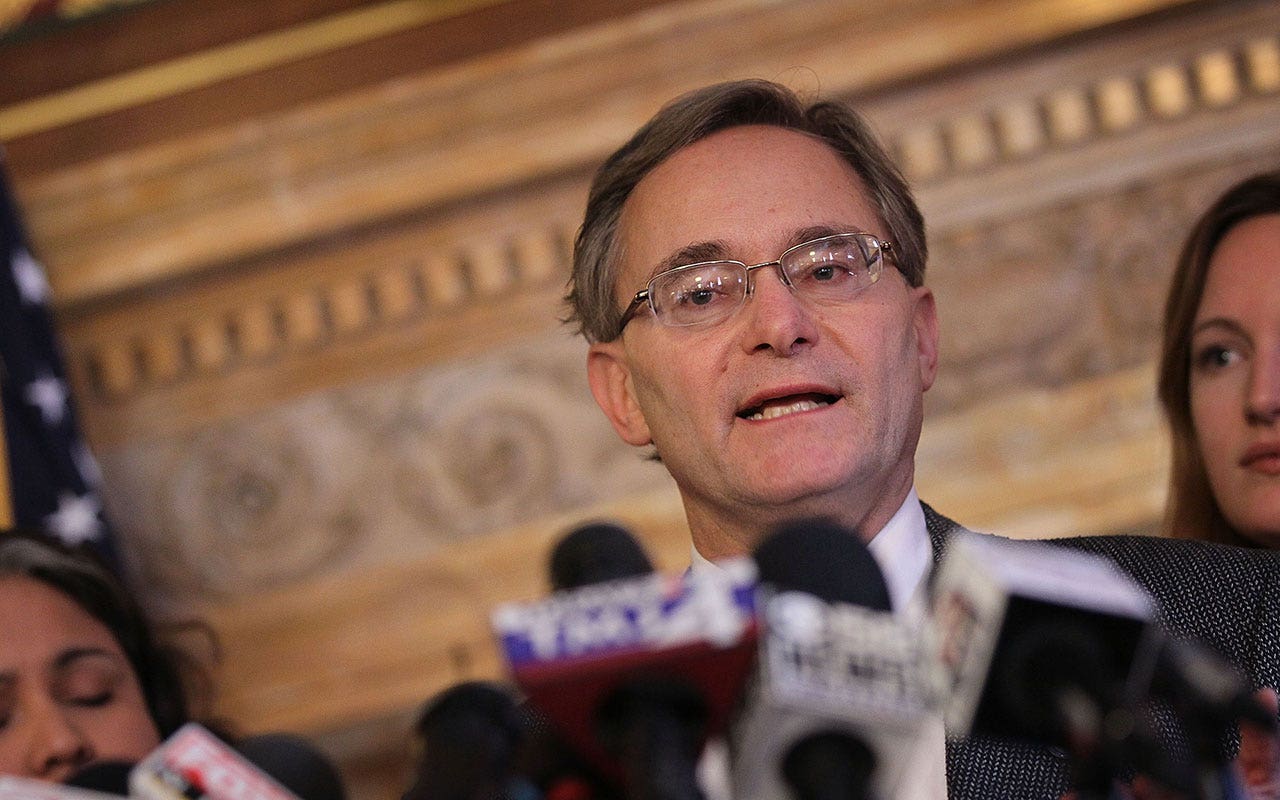
 Politics1 week ago
Politics1 week agoFormer Wisconsin Democratic Rep. Peter Barca launches congressional comeback bid


